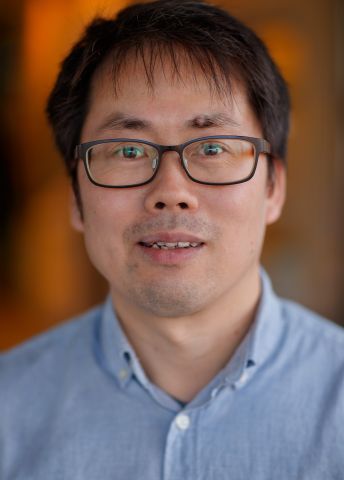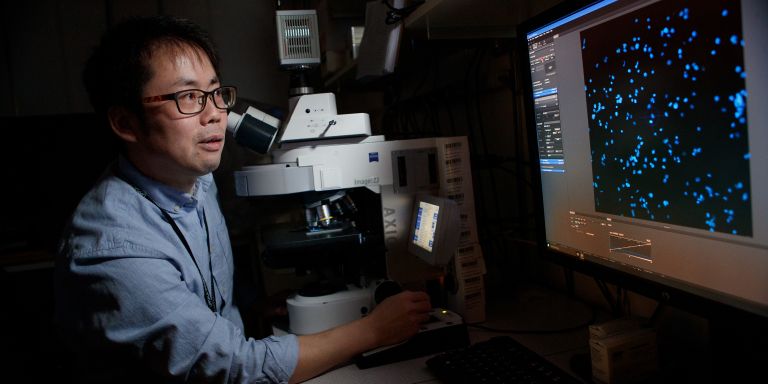
Xingqi Chen
Associate Professor of Molecular Medicine
Wallenberg Academy Fellow 2023
Institution:
Uppsala University
Research field:
Molecular mechanisms behind tumor development


Wallenberg Academy Fellow 2023
Institution:
Uppsala University
Research field:
Molecular mechanisms behind tumor development
Chen is a researcher at Uppsala University. His work may have major implications for cancer patients in the future. The central task is to create a better understanding of how metastases form.
In order for metastasis to occur, a cancer cell has to detach from the original tumor. The cell enters the bloodstream and is transported to another site in the body.
Cancer cells alter during this process. For instance, epithelial cells, which normally cover the surface of organs, transition into more mobile and invasive cells.
The surroundings of the tumor also play a key role. The cancer cells themselves change their microclimate by secreting substances that impact the immune system and surrounding healthy tissue.
“All these pathological changes increase the risk of metastasis and hence spread of the cancer,” says Chen.
But the question is: what causes this process? One answer is genetic mutations, but that is not the whole story. A further underlying factor is epigenetics.
Epigenetics may be described as an extra layer of information on top of the DNA sequence. Epigenetics concerns the way our genes can be switched on and off without any changes to the DNA sequence itself. It may be likened to tiny stickers that attach to DNA or its packaging proteins, thereby controlling how active the genes are.
Lifestyle and environmental factors impact epigenetics, and epigenetic changes can sometimes be inherited, which means that a parent’s lifestyle can impact their child’s health.
But whereas genetic mutations are permanent, the situation is different with epigenetic changes. They can be cancelled and reversed. Chen elaborates:
“Epigenetic changes are reversible, which renders them a potential target for new diagnostic methods and therapies.”
Chen’s aim is to develop what he calls an interdisciplinary toolbox. He plans to create a set of advanced methods in the fields of molecular biology, bioinformatics and microscopy that will make it possible to study cancer cells and their surroundings at a completely new level of detail.
He wants to use these methods to map the genome and epigenetics of individual tumor cells. It will also be possible to analyze the surrounding microenvironment. Cancer cells send out signal molecules that impact the immune system and surrounding healthy tissue.
“With the right technology we can now study these processes spatially, i.e. we can see exactly where in the tumor changes occur and how cells in different parts of the tumor differ.”
We want to develop tools that are not only of use to researchers, but can also benefit patients in the long term.
Cancer researchers often make use of biological material stored in biobanks in the form of tissue samples embedded in paraffin. The samples are invaluable for diagnosis and research. But it is hard to extract epigenetic information from them.
“That’s why we want to develop methods to ‘repair’ older material so we can analyze genetic markers and genetic changes in tissues that have been stored for a long time.”
This will enable the researchers to reveal unknown patterns by gaining a better understanding of patients’ history and being able to compare primary tumors with subsequent relapses and metastases.
In the first instance, the research is concentrating on colon cancer, which is a common and aggressive form of the disease.
“We’re using this type of tumor to show that the concept works,” says Chen.
The researchers hope the methods being developed will enable specialists to identify early signs of metastasis and, if possible, also prevent metastases from forming.
If the pilot study is successful, the researchers will be able to use the same toolbox on other forms of cancer.
“This may ultimately improve diagnosis and treatment on a broad front.”
The natural approach may eventually be to make use of genetic information in combination with medical examination as a complement to traditional microscopy and genetic analysis. In the long term, Chen hopes cancer therapies will become increasingly targeted, which may save more lives.
Chen has been working at Uppsala University since 2019, and heads his own research team. He received his PhD at Karolinska Institutet in 2014 and has also worked as a postdoc at Stanford University in the U.S.
As a Wallenberg Academy fellow, Chen has been awarded long-term funding for his research. This enables him to address much more difficult challenges. He elaborates:
“Access to these resources is a fantastic opportunity. It also means a lot to belong to a network of other researchers. I find the Swedish research community to be very supportive and encouraging,” he says.
Text Nils Johan Tjärnlund
Translation Maxwell Arding
Photo Magnus Bergström